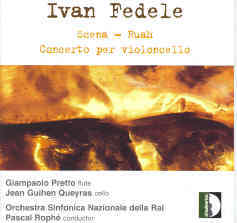

 |
 |
|
 FEDELE Concertos FEDELE Concertos
Scena Giampaela Pretta flute Jean Guihen Queyras cello Stradivarius STR 33650 [62 mins] The geographical lottery, combined with selective adoption of 'foreign' composers for marketing and promotion, determines which contemporary composers are known and heard in different countries. If you are reading this in UK, Ivan Fedele That he is the equal of several who are feted regularly in this country, with featured exposure in concert series and residencies, I have no doubt. This CD of major orchestral works provides as good an opportunity to begin to catch up as any of the others I have reviewed. I was first introduced to Ivan Fedele by an (until then) little known young Italian flautist, Mario Caroli at a solo flute recital in Strasbourg, and was a little embarrassed to confess I had not previously come across his music. I have taken every opportunity since then to hear Fedele's chamber, orchestral and vocal compositions on CD, and (live) in Stuttgart and Lisbon. It has been a rewarding journey of exploration. Ruah is a concerto for flute, 'the airiest instrument there is - - beyond pure sound breath turns into noise - - free from the influence of traditional modes of expression'. The orchestra provides 'a resonating environment' for the melodies and arabesques of the flute. It is a concerto for the new century, and played here with beautiful tone throughout by Giampaolo Pretto; I did wonder if Mario Caroli might not bring out different qualities, pointing the solo line with more drama and intensity, if he has the opportunity to add Ruah to his repertoire? The cello concerto is a major work in four movements played continuously. Fedele talks about the concept of 'resonance' - the orchestra 'a large resonating space - - an environment reacting to stimuli provided by the soloist'. He contrived that when the whole orchestra plays, it does so with 'extreme separation between the registers' so that the cello would occupy the central space without being covered up; at other times the soloist would 'stay afloat in the treble over the bass (or vice versa) - - in a game of alternation and diversification of harmonic fields between soloist and orchestra'. Scena was written for the Scala Milan, and premiered there by Riccardo Muti. It is a theatrically inspired piece with musical figures conceived as 'characters', theatre 'in the world of memory', with references to Italian theatre and La Scala in particular. An absorbing programme, which I have played through twice and will return to again. The music is both complex and accessible, to be enjoyed at various levels by students of contemporary music and by ordinary listeners. Ivan Fedele is published by SugarMusic SpA - Edizioni Suvini Zerboni and recorded by Stradivarius and other companies. Follow my links for his biography, discography with sound examples and to my own earlier reviews of Fedele's music: ECLAT 2001 Stuttgart February 2001 (Seen&Heard) There are two CDs available of music by Fedele, including a piano concerto with Bruno Canino as soloist Stradivarius STR 33348 ***** . A CD of the Stuttgart performance of Animus/anima (which will be broadcast by SWR2 on 24 April) would be particularly welcome, possibly coupled with a forthcoming Flute Concerto by Fedele due from Mario Caroli ? Ivan Fedele's violin concerto (1993), given in one of the Ensemble Intercontemporain 's concerts by its first interpreters, Á-Sun Yang and conductor Pascal Rophé, is a twenty minute single movement, which unashamedly celebrates the 19th C. romantic virtuoso violin concerto. The assured and well equipped soloist explored her material and bravura passage work, her part eschewing fashionable extended techniques, cushioned by a rather large chamber orchestra of double winds and percussion, plus harp, piano and cimbalom, skewed by having only a string quintet. This supports and punctuates the (very discreetly amplified) solo violin line with mainly homophonic gestures, their subtle orchestration giving the work its individual character. There is no conflict or sharing of material and the ovation by the small audience, its constitution in Lisbon not typical of the 'new music scene' elsewhere, was fully deserved. It must be as rewarding to play as it was enjoyable to hear, and should be well received by people who prefer traditional music as a welcome novelty included in an 'ordinary' symphony concert. For later development of this important Italian composer, try his piano concerto on Stradivarius Piano concerto; Epos and Chiari (MusicWeb)
|